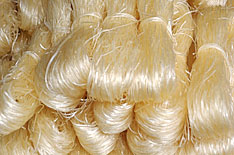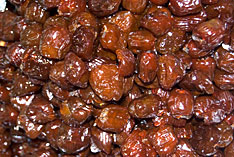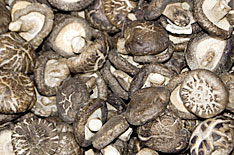Happy Chinese New Year!
Everyone from TamGood would like to wish everyone a joyous,
prosperous and healthy New Year in 2016!
Food Symbolism during Chinese
New Year Celebrations
(Source: One World Nation Online Website - link below)
The Chinese like playing with words and symbols.
Often homonyms (words that share the same
pronunciation but have different meanings) are
gladly used. Names of dishes and/or their ingredients
which will sound similar to words and phrases
referring to wishes expressed during the Chinese
New Year, while other foods hold a symbolic meaning.
Food offerings are a prayer or a wish and can be
addressed to ancestors and other beings such as the
Jade Emperor and The Kitchen God. The offering of
food serves to bring ancestors and other beings in
the other world closer to oneself.
The food offerings serve as a bonding tool to bring both worlds together.
Below a brief list of the food's symbolic meaning:
Abalone (sea snail; 鳆; fù) - definite good fortune
Apple (苹果; píngguǒ) - wisdom, peace
Apricot, dried (杏脯; xìngfǔ) - gold, wealth
Arrowhead (bot.: Sagittaria sagittifolia; 慈菇; cí gū) - benevolence
Arrowroot (bot.: Maranta arundinacea; 竹芋) - good life
Bamboo fungus (stinkhorn fungus; bot.: Phallus indusiatus; 竹笙, zhúshēng),
also called bamboo pith (竹荪; zhúsūn) - meaning: long life
Bamboo shoots (竹笋尖; zhú sǔn jiān) - wealth (term sounds like "wishing that everything
would be well" - xǔyuànchí), new start
Banana (香蕉; xiāngjiāo), on altar, offering - wish for education, brilliance at work/ school
Bean curd, dried/ tofu, dried (豆腐, dòu fǔ)- fulfillment of wealth and happiness (
note: dried tofu is not of white colour)
Bean curd sticks (腐竹; fǔ zhú) - blessing the house
Bean sprouts (豆芽; dòu yá, literally "bean sprout/germ" 芽菜; yá cài, literally
"sprout vegetable" or 银芽; yín yá, literally "silver sprouts") - 'to your heart's content',
positive start into the new year
Black moss (hair moss, hair weed), fat choy (髮菜; fàcài; a black hair-like cyanobacteria)
- wealth
Cabbage, Chinese (pak choy, 白菜) - 100 types of prosperity luck
Cabbage, stuffed packages - wealth (the shape symbolises an ingot)
Calms (scallops; 扇贝; shànbèi) - opening of new horizons
calm roll (干贝; gānbèi) - gold, wealth
Carrots (胡蘿蔔; hú luóbo; or 紅蘿蔔; hóng luóbo), red colour- good luck
Cashew nut (腰果, yāoguǒ)- gold, money (the nut's shape symbolises the gold bar of
ancient times)
Chicken (whole) (鸡肉; jīròu) - prosperity, togetherness of the family, joy
(note: chicken with its head, tail and feet symbolizes completeness)
Chinese garlic chives (韭菜, jiǔcài) - everlasting, eternity, long life
Coconut, nut (椰子; yēzi), flesh (椰肉; yēròu), juice/milk (椰汁; yēzhī) - promoting togetherness
Daylily buds, golden lily buds (金针; jīnzhēn; also called "golden needles") - wealth
Duck (鸭肉, yāròu) - fertility
Dumplings - dumplings exist in various kind, see: jiaozi dumplings, they represent the
ancient good pieces
Egg (蛋, dàn) - fertility
egg roll (蛋皮春卷, dàn pí chūn juǎn) - money, wealth, gold
Fa Gao (发糕; fāgāo) the steamed "Prosperity Cake"; the sound "fa" means either
"to raise/generate" or "be prosperous"
Fish (whole) - The word 魚 (yú), meaning "fish", has the same pronunciation as the word 餘,
which is "remain or surplus", 'having leftovers of money', an increase in prosperity
fish ball (鱼蛋; yúdàn) - reunion
Golden lilly buds, Daylily (bot.: Hemerocallis; 金针; jīnzhēn) - wealth
Gingko nuts ( 銀杏; yín xìng; or 白果, bái guǒ)- hope for silver, wealth
(the nut's shape represents a silver yuanbao/ ingot)
Glass noodles, Chinese vermicelli, cellophane noodle,
noodle threads (粉絲; fěn sī; also called "bean threads ",
mung bean thread) - silver chain
Grapes (葡萄, pútaó) - wealth, abundance, fertility,
many descendants, family harmony
Jiaozi- Dumplings (jiǎozi, 饺子) - wealth
(the shape of the jiaozi dumplings is that of a
pronunciation with 角子 (jiǎozi) that is a small jiao
coin used in old times.
Jujube (kind of date, red colour; 枣; zǎo, candied
jujube: 蜜枣; mìzǎo) - wealth, prosperity, fertility
Kumquat (金橘; jīn jú) - gold, hence fortune, wealth
Lettuce (生菜; shēngcài) - prosperity
lettuce roll, food being rolled into lettuce
- having a child soon
Longan (龙眼) - many good son
Lotus seeds/ -nuts/ -beans (蓮子; lián zĭ)
- a full wallet, many (male) offspring
lotus seeds,crystallized (蓮子糖; lián zĭ táng)
- a full wallet, many (male) offspring
Lychee (荔枝; lìzhī) - close family ties
Maize (玉米; yùmǐ) - growth
Mandarin (瓯柑; ōugān) - gold, wealth
Meat ball (肉丸; ròuwán)- reunion
Melon (瓜; guā) - family unity
melon, candied - growth, good health
Mixed vegetable (什锦蔬菜; shíjǐn shūcài) - family harmony
Muer mushroom, Black fungus, Three ear fungus, Wood ear (木耳; mù ěr) - longevity
Noodles (面条; miàntiáo) uncut - long life
Onion (洋葱; yángcōng) - cleverness
Orange (柑橘; gānjú) - wealth, good fortune, gold
Oyster (牡蠣; mǔlì) - receptivity to good fortune, good business
Oyster, dried (ho xi) - all good things, good luck
Peach - immortality
Peach, pair of (桃; táo) - wealth, abundance, long healthy life, great fortune for many
generations
Peanuts (花生; huāshēng) - health, long life, birth of prosperity, continuous growth,
multiplication in wealth and good fortune, stability
Pineapple (凤梨; fènglí) - wealth, luck, excellent fortune, gambling luck
Pomegranate (石榴; shíliu) - many offsprings
Pomelo (柚子; yòuzi) - abundance, prosperity,
having children, good health, family unity
Pork (猪肉; zhūròu) - strength, wealth, abundant blessing
Prawn (大虾; dàxiā) - liveliness
Pumpkin (南瓜; nánguā) - prosperity, abundance,
descendant's luck, illustrious children,
enchantment, fruit drawsearth energy to manifest gold
Rice (米饭; mǐfàn) - fertility, luck, wealth, rice
symbolizes a link between Heaven (Gods) and Earth
(Men)
Nian gao, (Chinese: 年糕; pinyin: nián'gāo) Sticky
(Rice) cake, Chinese new year's cake. It is considered good luck to eat nian gao because
it has the symbolism of increasing prosperity every year.
The New Year greeting 'Nian Nian Gao Sheng' (年年高升 niánnián gāoshēng) is to
wish people "advance toward higher positions and prosperity step by step."
Sticky rice - cohering of family
Rice is one of the Twelve Symbols of Sovereignty
Roseapple (Syzygium jambos; 蒲桃; pú táo) - calmness, peace of mind, no fighting
Seaweed, especially black moss, Fat Choy, (in Chinese: 髮菜; pinyin: fàcài;
literal meaning: hair vegetable). The two syllables of Fat Choy in Cantonese
sound the same as a Cantonese Chinese New Year greeting "Gung1 hei2 faat3 choi4"
(恭喜发财) meaning "congratulations and be prosperous"; additional meanings:
- good luck, exceeding wealth.
Seeds - lotus seeds, watermelon seeds, etc. - having a large number of children 籽 [zǐ]
Shitake, Black mushroom (冬菇; dōnggū) -longevity,
sizing opportunities
Shrimp (小虾; xiǎoxiā) - happiness and good fortune
Slender Noodle (細粉; xì fě) - see glass noodle
Snowpeas (荷蘭豆; hélándòu) - unity
Spring roll (春卷; chūnjuǎn) - wealth
(the shape represents a gold bar)
Sweet corn (甜玉米; tián yùmǐ) - growth, increase
Sweets, (糖食; tángshí, 糖果;tángguǒ) rice cake
(年糕; nián'gāo) - safety, good fortune and 'sweeten'
Tangyuan ( 湯圓 ,tāngyuán, "round balls in soup"),
sweet dumplings - togetherness, reunion
Tofu, dried (豆腐干; dòufǔgān) - fulfillment of wealth
and happiness, blessing the houses (note: dried tofu is not of white colour)
Tofu, fried (炸豆腐; zhá dòufǔ) - gold, hence wealth
Turnip cake (萝卜糕; luóbo gāo) - good omen
Vegetable, green (绿叶菜; lǜyècài) - close family ties
vegetable/ tofu (dried) - harmony, happiness and prosperity
Walnut (核桃仁; hétàorén) - happiness of the entire family
Water chestnut (荸薺; bíqí) - unity
Winter noodel (冬粉, dōng fěn) - see glass noodle
Yuanxiao, sweet dumpling (元宵; yuánxiāo) - togetherness, reunion
Information Source: http://www.nationsonline.org/oneworld/Chinese_Customs/food_symbolism.htm
| |||||||||||








